Ruth Mikusko (Theatre and Dance) at The Great Dickens Christmas Fair where she has worked as a senior dresser at the Corinthian Rose Fencing Academy since 2017. L: Christian Barnard '26 (Political Science, Theatre Arts), Kenzie Hill '27 (Environmental Studies), Ruth, and Kristin Hill '25 (Theatre Arts, Communication); R: Ruth with a dancing friend in the Griffin & Thistle Club attached to the Academy. Alumna Kaitlin Zablotsky '16 (Finance) also visited the fencing booth this year.
Dear Colleagues,
Here we are at the end of another quarter! I hope your finals have gone well and wish you luck as you wrap up grading for the Fall.
Last month, I participated in the Forum on Academic Freedom with Provost Glaser, and Howard Schweber (University of Wisconsin Law and Politics Professor emeritus), moderated by Kate Morris (Art & Art History, Provost’s Office). Professor Schweber inspired us to keep sight of important constitutional first principles as we grapple with free speech and academic freedom challenges in the months ahead.
I wanted to share a reminder to submit any edited or published scholarly books, audio recordings, or films to the Library as they catalog and celebrate new publications by faculty. Their annual celebration of new publications will take place in February.
This will be our last College Notes for the calendar year. We’ll be back after a much needed winter break with more to share at the end of Week 1 in January.
As we finish up Fall Quarter, I note that we lost a great poet this week, Nikki Giovanni, at the age of 81. How fitting, then, to read her elegiac poem in honor of another great poet, Gwendolyn Brooks.
Sincerely,
Daniel
No Complaints
By Nikki Giovanni
(For Gwendolyn Brooks, 1917—2001)
maybe there is something about the seventh of June: Gwen,
Prince and me . . . or maybe people just have to be born at some
time . . . and there are only three hundred sixty-five days or three
sixty-six every four years or so . . . meaning that some things
happen at the same time in the same rising sign . . . and the same
houses in Gemini . . . but some of us might also consider the
possibility of reincarnating revolving restructuring that spirit . . .
reshaping that spirit . . . releasing that spirit . . . tucking the use-
less inside and when the useless pushes out again we restructure
again and poetry and song and praisesong go on . . . because it is
the right thing to do
we always will cry when a great heart . . . a good soul . . . one of
the premier poets of her age restructures . . . reincarnates . . .
revolves into a resolve that we now carry in our hearts . . . as all
great women and men are alive . . . not by biology but remem-
brance . . . and that’s all right . . . as the old folk say . . . because as
long as they stay on the lips . . . they nestle in our hearts and those
souls which are planted . . . continue growing . . . until generations
not knowing their touch . . . their voice . . . or even the fact
that some Chicago poets are terrible cooks . . . but always fun
to eat with . . . will tell tales of having met someone who knew
someone who once watched a basketball game . . . in which some
Chicago poet cheered for Seattle at the request of some Virginia
poet who wanted more games . . . while Mr. Blakely was amazed
that a Chicago poet was even watching a game . . . and didn’t
we miss him as he slipped away watching baseball . . . and what
a way to go . . . though we then did sort of know . . . that once
gone . . . he would call the woman he loved
and so we come to no more phone calls at six a.m. to chat ...
and no more Benihana when we are all in New York . . . and no
more gossiping and questioning and trying to make sense of a
senseless world . . . no more face-to-face . . . only the poetry which
is a great monument from this Topeka daughter to the world . . .
and yet . . . there can be no complaints in this passing . . . no
sorrow songs . . . no if onlys . . . it is all here: the work the love:
the woman: who gave and gave and gave . . . no complaints of too
long or too hard . . . no injustice of accident or misunderstanding
of disease . . . just one great woman moving to the next phase . . .
and us on the ground . . . giving Alleluias
Highlights
Riley Carpenter '25 (Physics), a 2024 Goldwater Fellow, received the Steven Chu Award (First Place) for best research by an undergraduate student at the 2024 Far West Section of the American Physical Society. Riley's award-wining presentation was entitled, "Characterizing Low-Superconducting-Gap Materials for meV-Scale Dark Matter Detector Fabrication." The work was done in collaboration with Betty Young (Physics) and DMQIS collaborators at SLAC.
Image: Riley Carpenter presenting his research on thin film fabrication of superconducting quantum sensors.
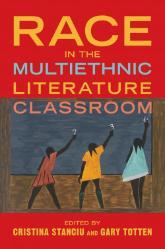
Marilyn Edelstein (English, Emerita) has just published her chapter "Empathy for the Other: Multiethnic Literature and the Possibilities of Empathy across Racial, Gender, and Cultural Differences” in the book Race in the Multiethnic Literature Classroom, edited by Cristina Stanciu and Gary Totten (University of Illinois Press, 2024). Many chapters in this book address current debates about if, when, and how to teach about the histories and practices of racism in the U.S. The book is divided into four sections: “Racial Literacies,” “Race, History, and Pedagogy,” “Racial Justice and Antiracism,” and “Race, Racism, Empathy, and Hope.” Marilyn’s chapter, which appears in this last section, focuses on how and why reading contemporary multiethnic American short stories and first-person narratives may enhance student readers' cognitive and affective development, especially across racialized, gendered, and cultural differences. She reviews multiple theoretical analyses of the concept of empathy and addresses the importance of emotion in the multiethnic literature classroom. Then, through brief analyses of a first-person narrative by Jesmyn Ward and short stories by Jhumpa Lahiri and Sandra Cisneros, she explores the authors’ narrative strategies and her own teaching strategies that may help enlarge students’ capacities for genuine empathy (or “co-feeling,” rather than sympathy) and perhaps overcome some students’ cognitive and affective resistance to thinking about or feeling with "the other" and their tendency either to “other the other" or to efface meaningful and irreducible differences.
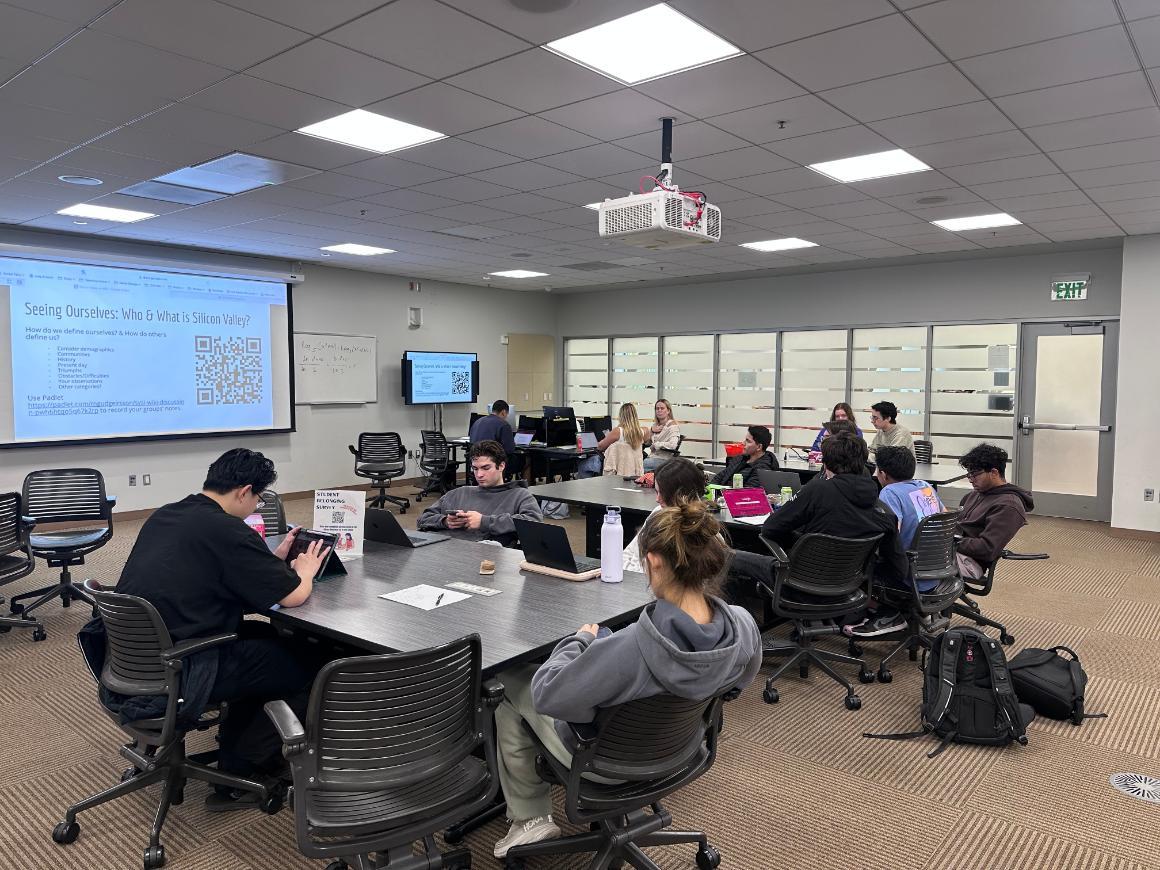 Students discuss their definitions of Silicon Valley in the Library. Students discuss their definitions of Silicon Valley in the Library.
On November 18, the Silicon Valley Studies Initiative, directed by Meg Gudgeirsson (History), hosted its first event, "Silicon Valley on Wiki: How We See Ourselves on Wikipedia," co-sponsored by the Digital Humanities Initiative and the Library. Approximately 25-30 students attended and engaged in thoughtful discussions about how we define ourselves and how well that is reflected on Wikipedia.
Michelle Rivers (Psychology) presented a talk entitled, "Does Pretesting Enhance Learning When it is Done Covertly?" at the Psychonomic Society's 65th Annual Meeting in New York City. This talk focused on research that found that taking pretests prior to a lesson - even when learners provide incorrect responses - enhances learning, with both written and mental formats equally enhancing performance. The talk was highlighted in the conference newsletter.
Michelle also served on a panel entitled, "You Don't Know What You Don't Know - But How to Figure it Out" for a Women in Cognitive Science (WiCS+) pre-conference meeting. She shared her experiences navigating the academic job market and forming an early-career networking group for scholars in the science of learning. Finally, Michelle was honored with a WiCS+ Junior Research Networking Award.
Image: Michelle Rivers presenting at the Psychonomic Society Annual Meeting in November 2024.
Rohit Chopra (Communication) co-authored a report, " Streaming Violence: How Instagram Fuels Cow Vigilantism in India," released on November 19, by the Center for the Study of Organized Hate (CSOH), on how Instagram fuels Hindu right-wing cow vigilante violence against minorities in India. (Rohit serves an advisor to the Center.)
The report is a mixed methods large-scale data analysis and narrative analysis of violent content on Instagram generated by Hindu vigilantes who target Muslims, often with official support from BJP governments, on grounds of illegally smuggling and slaughtering cattle. Vigilantes post reels of their efforts on Instagram, featuring vehicle chases, harassment, and assaults against Muslims. In some cases, these assaults have resulted in the death of Muslims. The reels also serve as inspiration for aspiring vigilantes.
The report has already been covered extensively by PBS and Wired. While Instagram or Meta have not responded officially to the report, some of these reels have already been taken down by the company.
Rohit also delivered an invited lecture titled, "Social Media and the Hindu Right" at Stanford University on November 19. Organized by the Markaz Resource Center and Center for South Asia (with which Rohit is affiliated as a Visiting Scholar for 2024-25), the lecture described the history and strategies of the global Hindu Right's weaponization of social media to target minorities, attack dissidents, and seek broad cultural legitimacy for its ideology across Indian communities within and beyond India.
Tom Plante (Psychology) provided an invited CE workshop for mental health professionals on December 2, 2024 sponsored by the American Psychological Association (Division 18, Public Service) entitled "Ethical Considerations in Evaluating, Treating, and Consulting with LGBTQI+ Populations."
Workshop Description: Recent years have seen a surge in the need for LGBTQI+ health services with a significant increase in the number of people who identify as LGBTQI+, including those who identify as nonbinary or transgender. Advocacy for the LGBTQI+ community has been met with significant pushback from conservative political voices across the country. Psychologists and other mental health professionals trying to do their very best to provide high-quality, evidence-based clinical best practices can be challenged to do so in rapidly changing and politically polarizing times. Ethical conflicts often arise, too. The purpose of this workshop is to review how the APA Code of Ethics can help us organize and center our thinking to best assist LGBTQI+ clients and their families. Rapidly emerging areas of clinical work influenced by politics and strong feelings without clear best practices and clinical guidelines are especially challenging but our dedication to quality and ethical professional services demands our vigilance and attention.
Tom also had several journal articles published in December including:
Plante, T. G. (2024). Confronting religious and spiritual discrimination in clinical and professional Practice. Spirituality in Clinical Practice, 11(4), 419-423.
Plante, T. G. (2024). Spirituality in Clinical Practice: Updates and Transitions. Spirituality in Clinical Practice, 11(4), 424-425.
Plante, T. G. (2024). Ethics Corner: Cultural humility and diversity efforts in professional psychology should include religion and spiritual too. On Board with Professional Psychology, Issue 4.
On November 21, a crew from PBS Kids (Jorge Cham and Allison Sanders) came to Santa Clara’s campus to film Desirée Forsythe (Biology) for an upcoming season of the popular kids show, Elinor Wonders Why. Created by Jorge Cham (also creator of the infamous PhD comics) and Daniel Whiteson, Elinor Wonders Why follows the adventures of a curious bunny rabbit (Elinor) and her friends Ari the bat and Olive the elephant as they make discoveries using science inquiry skills. The upcoming season was funded by the National Science Foundation to teach boys how to work together better in groups and follows Ari as he learns from his mistakes while interacting with his peers.
Desirée was particularly excited about this season because of its focus on teaching boys how to be more inclusive, rather than the typical focus on teaching girls how to be more resilient. The project chose Desirée because of her biology background as well as her research focus on disrupting oppressions in science. Desirée was filmed for a 6-minute segment in which she and Ari will reflect on all of his lessons learned and will launch sometime in April or May. Filming took place in the Forge Gardens and the Sobrato Campus for Discovery and Innovation.
Image: Desirée Forsythe chats with Ari the bat for the upcoming season of Elinor Wonders Why on PBS Kids
Vanessa L. Errisuriz (Public Health) recently presented her research at the APHA 2024 annual meeting and Expo in Minneapolis, Minnesota. She shared findings from two studies. The first study, “¡Salud, Salud!: Preliminary findings and sustainability planning of a culturally tailored, family-centered type 2 diabetes self-management program for low-income Latinos”, highlighted the use of an academic-community partnership to design an effective and sustainable digital health intervention aimed at promoting diabetes self-management among an underserved population. The second study, conducted in collaboration with Alice P. Villatoro (Public Health), was entitled “COVID-19 Vaccine Perceptions among College Students: Differences by Gender, Socioeconomic Status, Previous COVID-19 Illness, and TV/Digital Media Use.” This research revealed that male students, those with higher-income, those who had previously contracted COVID-19, and heavier TV/digital media users were more prone to vaccine misinformation.
In addition to her presentations, Vanessa received the 2024 Excellence in Membership Engagement Award for her outstanding service as Secretary of the Community Health Planning and Policy Development Section of the American Public Health Association.
Image: Vanessa Errisuriz with collaborators Deborah Parra-Medina (University of Colorado Anschutz Medical Campus), and Zenong Yin (University of Texas at San Antonio) in front of the Hahn/Cock sculpture in the Minneapolis Sculpture Garden.
Iris Stewart-Frey (Environmental Studies and Sciences, Environmental Justice & Common Good Initiative) and the California Rural Legal Assistance, Inc. (CRLA) received a Rose Foundation grant of $175,000 to advance the human right to clean water in rural, low-income California Central Coast communities. The Water and Climate Justice Lab, led by Iris and supported by Jake Dialesandro (Environmental Studies and Sciences), will identify high-nitrate wells and variability in nitrate through a residential well testing program in disadvantaged unincorporated communities, analyzing available and monitored data on contaminants in drinking and residential water, and developing and presenting accessible information to communities. CRLA will provide outreach and education to residents. The Water and Climate Justice Program and CRLA will collaborate with other local community organizations to build community residents’ capacity to understand relevant water quality issues, giving them the tools to participate effectively in public planning processes, and work toward protecting and conserving existing drinking water supplies.
|
|
Material Concerns Exhibition
9 AM - 4 PM | Edward M. Dowd Art and Art History Building
Exhibition Dates: Dec 2, 2024 - Jan 31, 2025
Pilar Agüero-Esparza & Hector Dionicio Mendoza work with specific materials chosen for their materiality and signifying potential. Informed by craft and the hand-made object, these artists combine their material interests with their social concerns to spotlight specific cultural experiences and give voice to marginalized communities.
Reception Date/Time: Jan 30, 2025 5:30-6:30pm, Dowd Lobby |
|
|
Faculty Associates office hours
Various times | Varsi 128 (Weekly through June 2025)
You can get personalized support and feedback about your teaching materials, course design, and more by connecting with one of our Faculty Associates at their new weekly Office Hours. No need to RSVP, just show up with your questions!
Mondays
Noon-1 PM Patti Simone (Psychology/Neuroscience): Areas of expertise include advising, FAR, inclusive teaching, promotions.
3-4 PM C.J. Gabbe (Environmental Studies and Sciences): Syllabus design, assignment design, and community-based learning.
Wednesdays
1-2 PM Justin Boren (Communication): TESE, student engagement, FAR preparation, transparent design, faculty support, burnout, mentoring.
Thursdays
1:15-2:15 PM Mythri Jegathesan (Anthropology): FAR preparation, accessibility/inclusivity, academic freedom, personal statement writing (R&T and FAR).
Fridays
3-4 PM Cara Chiaraluce (Sociology): Teaching track promotions, accessibility/inclusivity (in-person and online).
|
|
|
The Mobile Professor
9 - 11 AM | Learning Commons 141
A majority of SCU students use the Canvas mobile app to access content in their Camino courses, to engage with peers, and to submit assignments and assessments. Learn how you can use the app as an instructor to optimize your students’ mobile Camino learning experience and to further engage with your students. Also on December 19, 1 - 3 PM. |
|
|
Camino Assignments (Virtual)
2 - 3 PM | Zoom
The Camino Learning Management System allows you to create a variety of assessment types using the Assignments tool. A well-planned series of assignments in Camino gives your students the feedback they need to succeed while simplifying your grading process. Learn how to create, grade, and provide feedback to students in Camino in this hands-on workshop. |
|
|
Camino Quizzes (Virtual)
1 - 2 PM | Zoom
Learn how to create, moderate, and grade quizzes in Camino’s New Quizzes tool. Activities include learning how to make various question types, create question banks, and set up grading, and interpreting quiz result reports. |
|
|
Optimizing Teaching and Learning through Course Design (Virtual)
9:30 - 11:30 AM | Zoom
This workshop will teach you how to enhance student engagement through thoughtful Camino course design. Drawing from instructional design principles and research-based frameworks for course development, you will learn ways to align your learning objectives with course materials, learning activities, instructional tools, and course accessibility to put student learning at the center of your course design. |
|
|
Engaging Students with Poll Everywhere (Virtual)
3:30 - 4 PM | Zoom
Santa Clara now has a license for the Poll Everywhere tool. Come learn how you can engage your students with in-class polls and sharing results live. This hands-on tutorial will teach you everything you need to know to begin using the Poll Everywhere tool. |
|
|
Camino Basics (Virtual)
10 - 11 AM | Zoom
Learn the basics of Camino, SCU’s branded version of the Canvas Learning Management System. Topics include: how to log in, access courses, communicate with students, change your personal and course settings, upload a syllabus, and organize resources in Modules. |
|
|
AI Prompts and Possibilities for Teachers
1 - 3 PM | Learning Commons Room 141
With the advent of generative AI, educators continue to encounter an expansive array of opportunities and challenges. During this workshop, you will learn about how students and faculty can use generative AI in their learning and teaching, and how you can thoughtfully integrate it into your pedagogy. |
|
|
AI as a Productivity Tool for Teachers
10:30 AM - 12:30 PM | Learning Commons Room 141
Learn how to expedite your teaching preparation using AI and save time. In this workshop, you will learn strategies for using generative AI to help you create course materials and design course activities as a pedagogical productivity tool. |
|
|
Student Collaboration with Hypothes.is (Virtual)
2 - 2:30 PM | Zoom
Learn how you can use the Hypothes.is social annotation tool to support student learning and collaboration. Students can use Hypothes.is to learn from one another as they collaboratively take notes and ask questions of shared materials. This hands-on tutorial will teach you everything you need to know to begin using Hypothes.is in Camino.
|
|
|
Course Prep Working Session
2 - 5 PM | Varsi 222
The Course Prep Working Session will also have experts on hand to support assignment design, syllabus design, Camino set up and other pedagogical questions. The working session will be followed by a Happy Hour from 4:00-5:00 to celebrate the last quarter and look forward to the new term ahead. Come for any portion of the working session and/or happy hour that is meaningful to you. |
|
|
Zen Meditations
5 PM | Multifaith Sanctuary, St. Joseph Hall
Let go of your day and prepare for the evening by stretching, de-stressing, calming the body, and soothing the mind. We start each session with a de-stress guided meditation and transition to silent sitting and walking meditation. All are welcome! Led by Sarita Tamayo-Moraga (Religious Studies).
|
|
|
Camino Gradebook (Virtual)
11 AM - Noon | Zoom
Make full use of Camino’s grading features to manage grade visibility and execute complex grading processes. Participants will learn how to: set up their gradebook with a grade posting policy that matches their grading workflow, configure weighted grades, and show students where they can view instructor feedback. |
|
|
Accessible Course Materials: What You Need to Know (Virtual)
1 - 3 PM | Zoom
Learn best practices for creating inclusive course materials by exploring key accessibility features of common formats for documents and media. Gain hands-on experience with Camino’s integrated accessibility tools. Consider how course content can be inclusive from the very beginning. |
|
|

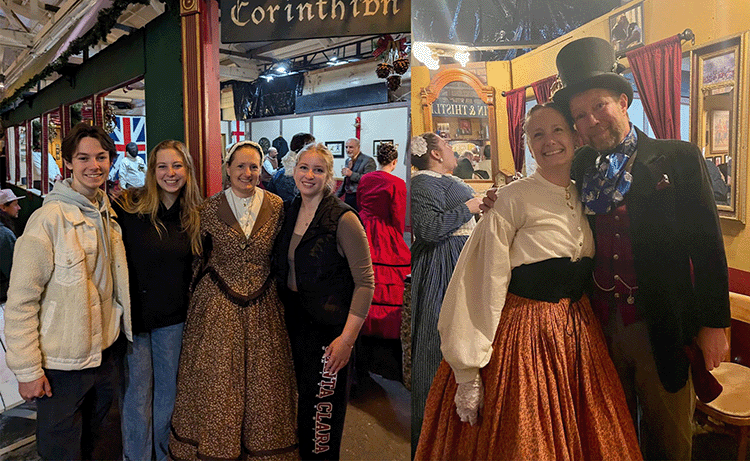
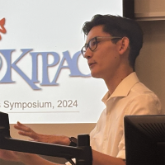

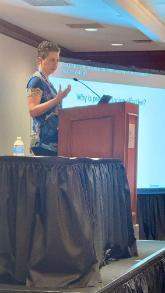
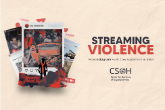
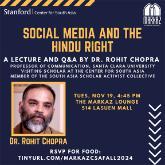

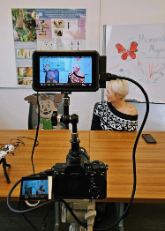
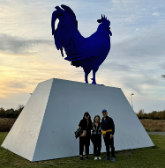
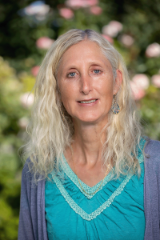
 Students discuss their definitions of Silicon Valley in the Library.
Students discuss their definitions of Silicon Valley in the Library.